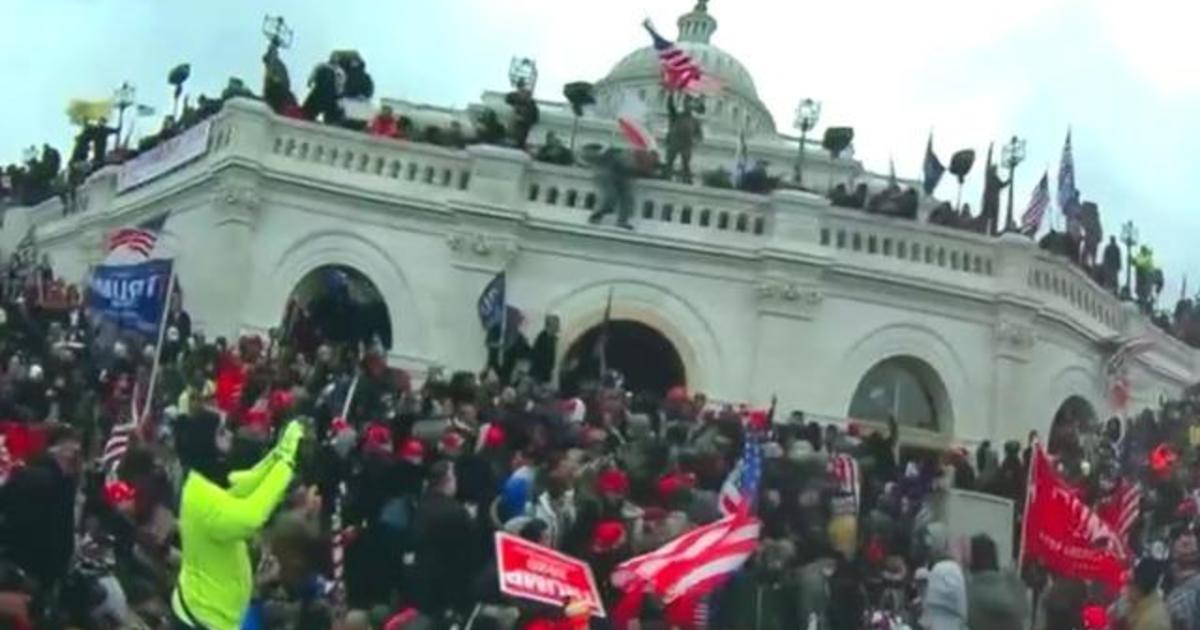The House select committee investigating the Jan. 6, 2021, assault on the U.S. Capitol revealed new insight into what happened that day during its prime-time hearing Thursday night. It was the first in a series of scheduled public hearings.
Many of the revelations Thursday night came from recorded, on-camera testimony from witnesses, including former President Trump’s own daughter, who have appeared before the committee over the past several months. The hearing also featured new testimony from witnesses who were at the Capitol that day. While some elements of these topics may have surfaced in news reporting, Thursday night’s hearing put details on the record.
Here are six things the hearing publicly confirmed for the first time Thursday night:
1. Trump never called on any law enforcement entity to protect the Capitol. Instead, Pence did, Cheney says.
According to Vice Chair Liz Cheney, Trump, who was president at the time of the riot, did not make a single call to a federal entity to direct law enforcement agencies to protect the Capitol. Instead, then-Vice President Mike Pence did, effectively taking on the role of president.
“Not only did President Trump refuse to tell the mob to leave the Capitol, he placed no call to any element of the United States government to instruct that the Capitol be defended,” Cheney said. “He did not call his secretary of defense on January 6. He did not talk to his attorney general. He did not talk to the Department of Homeland Security. President Trump gave no order to deploy the National Guard that day. And he made no effort to work with the Department of Justice to coordinate and deploy law enforcement assets. Vice President Pence did each of those things.”
In audio the committee played, Mark Milley, chairman of the Joint Chiefs of Staff, said Trump chief of staff Mark Meadows urged him to establish a “narrative” that Trump, not Pence, was in control and calling the shots. Milley said he viewed that request as “politics, politics, politics.”
It’s likely the committee will elaborate more on this point in the hearings ahead, since exactly what Trump was doing in those critical hours on Jan. 6 remains unclear.
2. Ivanka Trump said she accepted Barr’s assessment of the election
Then-Attorney General William Barr testified that he told Trump he disagreed with his belief that the 2020 presidential election was stolen.
“I made it clear I did not agree with the idea of saying the election was stolen and putting out this stuff, which I told the president was bullsh**,” Barr said in recorded testimony. “And I didn’t want to be a part of it.”
When Barr determined that President Biden had in fact won the election, Ivanka Trump, Trump’s daughter and adviser, told the committee she believed him.
“I respect Attorney General Barr. So, I accepted what he was saying,” she said.
The president’s daughter was the first member of the former first family whose testimony was aired during the hearings.
3. Multiple Republican lawmakers sought pardons from the White House after Jan. 6
Cheney also claimed multiple Republican members of Congress sought presidential pardons in the days after the riot at the Capitol, including Rep. Scott Perry. Perry has declined to comply with committee subpoenas.
“Multiple other Republican congressmen also sought presidential pardons for their roles in attempting to overturn the 2020 election,” Cheney said.
She did not name the other Republicans.
4. Jared Kushner took White House counsel’s threats to resign as “whining”
The president’s son-in-law and a top adviser, Jared Kushner, was asked by Cheney during his taped deposition about “multiple threats” made by White House counsel Pat Cipollone and his team to resign amid what Cheney termed the “lawless activity” surrounding Trump’s efforts to hold onto the presidency.
“Are you aware of multiple instances where Pat Cipollone threatened to resign?” Cheney asked Kushner in a clip played during Thursday’s public hearing.
“Like I said, my interest at that time was on trying to get as many pardons done as possible,” Kushner said. “And I know him and the team were always saying, we are going to resign, we are not going to be there if this happened, if that happens. So I kind of took it up to be just whining, to be honest with you.”
5. Proud Boys started marching to the Capitol before Trump’s speech started
The Proud Boys began marching to the Capitol before Trump’s speech rallying supporters even began, according to documentarian Nick Quested, who was in the middle of filming a documentary on the Proud Boys on Jan. 6.
“I was confused to an extent why we were walking away from the president’s speech because that’s what I felt we were there to cover,” Quested said.
6. Members of Trump’s Cabinet discussed the 25th Amendment, Cheney says
Cheney said members of Trump’s Cabinet discussed the “possibility of invoking the 25th Amendment,” adding the American public will hear more about it in the coming public hearings. The 25th Amendment provides the Cabinet a path to replace the president. It was never invoked on or in the days after Jan. 6.
